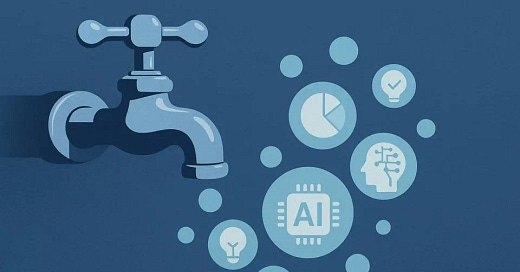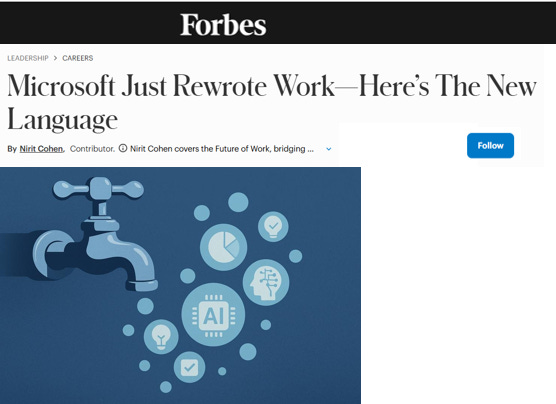Microsoft Just Rewrote Work—Here’s the New Language
Microsoft’s 2025 Work Trend Index introduces a new vocabulary for the AI era—terms like Frontier Firm, Agent Boss, and Intelligence on Tap that signal a radical shift in how we work, manage, and lead.
How we talk about work shapes how we work.
This week’s thought letter takes a look at the new language Microsoft introduced for the new world of work.
Served weekly with❤️,
Nirit
This article was initially published on Forbes»»
The future of work has arrived.
It’s here earlier than anticipated.
We’ve spent years inching toward the future of work, planning for it bit by bit.
But it didn’t arrive gradually.
It snapped into place all at once.
That’s the feeling Microsoft’s 2025 Work Trend Index delivers. It doesn’t add tools—it redraws the entire map.
And before we can navigate that new terrain, we need to learn the language it’s written in.
We’re not just being asked to work differently. We’re being asked to reimagine the structure, purpose, and language of work itself.
This year, Microsoft isn’t talking about hybrid work or upskilling. It’s naming 2025 as the year the Frontier Firm is born—an organization powered not just by human effort, but by intelligence that’s scalable, on demand, and ambient.
Intelligence on Tap.
Let that sink in: Intelligence on Tap. Like electricity. Like cloud storage. Like bandwidth.
Expertise becomes a utility—not something you hire, but something you access.
When you combine that idea with AI agents capable of planning, reasoning, and taking action, the ripple effects are seismic. For people. For organizations.
And this reshapes what it means to build a career, to manage a team, to lead an organization.
In other words, regardless of your role in the world of work, your job just shifted.
Rethinking the Organization Itself
This is where the most radical shift happens.
For decades, intelligence was a scarce resource—limited by human time, cost, and capacity. But that constraint is vanishing. With AI and agents that can reason, plan, and execute, intelligence is no longer confined to the people you hire. It’s becoming scalable, on-demand, and ambient—a capacity you can access, not just employ.
But if your people can build the intelligence they need, then why are you still organizing around job titles and departments?
Drawing on global insights from 31,000 workers, real-time LinkedIn data, and trillions of Microsoft 365 signals—alongside conversations with startups, economists, and researchers—Microsoft sketches out the emerging blueprint for what it calls a Frontier Firm.
These firms move faster, scale smarter, and create value more dynamically than traditional organizations. Their structures shift from static org charts to what Microsoft calls Work Charts—fluid, outcome-driven formations where teams assemble around tasks, not titles.
You don’t build teams—you orchestrate them around the work that needs to be done, not fixed roles and responsibilities.
That’s not just theory. Frontier Firms are already taking shape—and in the next few years, most organizations will be pushed to follow. Microsoft found that 82% of leaders see 2025 as a pivotal year to rethink structure and strategy, with the majority expecting AI agents to play a major role within the next 12 to 18 months.
And who manages this new mix of human and AI capacity?
Perhaps not Human Resources as we know it, but a blended HR and IT function that manages Intelligence Resources—both types of labor: people and agents. Think of it as the team that designs and staffs hybrid teams, tracks the Human-Agent Ratio, and ensures oversight, trust, and results.
And What About Managers?
If employees were the ones leading AI adoption last year—bringing their own tools and experimenting at the edges—this year marks a sharp turn.
Now, it’s leaders who are moving faster.
67% of leaders are familiar or extremely familiar with agents compared to just 40% of employees. And 79% of leaders believe AI will accelerate their careers versus 67% of employees.
Why are managers ahead?
As Colette Stallbaumer, General Manager of Microsoft 365 Copilot and Co-Founder of WorkLab at Microsoft, told me in a recent conversation on The Future of Less Work podcast,
“Leaders recognize they can’t afford to sit on the sidelines. They can’t afford to wait in order to stay competitive.”
Likely because they’re the first under pressure to have a clear AI strategy—and the first held accountable if it fails. But more than that, managing AI plays to what great managers already do well: delegate, coach, course-correct. They’re used to coaching team members, setting expectations, building trust. And that’s exactly what working with AI agents now requires.
In other words, we don’t need to reinvent management.
We just need to redirect it—toward people and machines, to design and orchestrate performance across a hybrid team, many of whose members aren’t human.
From Coworkers to Agent Bosses
Which brings us to the individual—each one of us.
We’re not just learning to use AI—we’re learning to manage digital peers. To assign work to agents. To onboard them, train them, refine their outputs. To know when to override and when to trust.
The report introduces the Agent Boss—a new archetype for the modern worker who leads not just people, but AI agents. Not the solo expert. Not the individual contributor. But the human who knows how to delegate across a hybrid team of people and bots.
“Now everyone can be an agent boss,” said Stallbaumer. “Think of your work like you’re the CEO of your own startup. How are you deploying AI to get things done throughout every part of your workday?”
And for those who embrace it, the opportunities are extraordinary.
“A junior person can manage a crew of intelligent agents and perform senior-level work in months instead of years,” she explained.
The career ladder? It just got replaced with a launchpad.
It’s not magic—it’s a mindset shift: from “What can I do?” to “What can I delegate?”
And it starts with learning how to build your first agent.
Why This Moment Matters
We’re not in the planning phase of this transformation.
We’re in the rollout.
And yet, most of us—leaders, employees, HR—are still using the language of the old map. We’re measuring people by role, not impact. We’re designing orgs for predictability, not adaptability. We’re waiting for permission to experiment, when in fact, the only risk now is standing still.
That’s why this report deserves more than a summary.
It demands reflection.
What kind of organization do you want to work for—or lead?
What kind of manager do you want to be when part of your team isn’t human?
And what kind of career are you building if success depends not on how much you can do—but on how well you can scale yourself through intelligent agents?
Take a breath.
The map has changed.
And the language we use to describe work is changing with it.
We’ve only begun to explore what that means—and where it might lead.
Your Turn:
Did you build your first AI Agent yet?
Served weekly with ❤️,
Nirit
![TheFutureOfLess[?]Work](https://substackcdn.com/image/fetch/w_80,h_80,c_fill,f_auto,q_auto:good,fl_progressive:steep,g_auto/https%3A%2F%2Fsubstack-post-media.s3.amazonaws.com%2Fpublic%2Fimages%2Feaee5ab5-0825-4b77-be17-20871805b782_1280x1280.png)
![TheFutureOfLess[?]Work](https://substackcdn.com/image/fetch/e_trim:10:white/e_trim:10:transparent/h_72,c_limit,f_auto,q_auto:good,fl_progressive:steep/https%3A%2F%2Fsubstack-post-media.s3.amazonaws.com%2Fpublic%2Fimages%2Ffcc9d426-5684-49a5-8d01-fa4b458d333c_2801x534.jpeg)

![TheFutureOfLess[?]Work](https://substackcdn.com/image/fetch/w_36,h_36,c_fill,f_auto,q_auto:good,fl_progressive:steep,g_auto/https%3A%2F%2Fsubstack-post-media.s3.amazonaws.com%2Fpublic%2Fimages%2Feaee5ab5-0825-4b77-be17-20871805b782_1280x1280.png)
